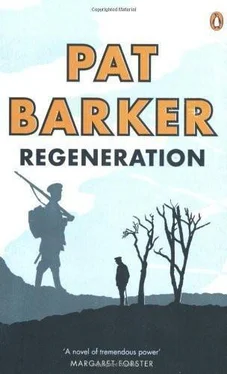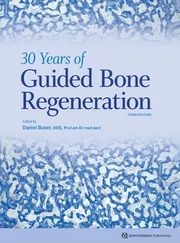He was. Yealland came out of his room, flanked by two junior doctors, shook hands briskly and said that he thought the best general introduction was perhaps simply a ward round.
The party consisted of Yealland, the two junior doctors who were being put through their paces, a ward sister, who made no contribution and was invited to make none, and a couple of orderlies who hovered in the background in case they were required to lift. Yealland was an impressive figure. In conversation he did not merely meet your eye, but stared so intently that you felt your skull had become transparent. His speech was extremely precise. Something in this steady, unrelenting projection of authority made Rivers want to laugh, but he didn’t think he’d have wanted to laugh if he’d been a junior doctor or a patient.
They did the post-treatment ward first. The bulk of the conversation was between Yealland and the two junior doctors, with occasional asides to Rivers. Contact with patients was restricted to a brisk, cheerful, authoritative greeting. No questions were asked about their psychological state. Many of them, Rivers thought, showed signs of depression, but in every case the removal of the physical symptom was described as a cure. Most of these patients would be out within a week, Yealland said. Rivers asked questions about the relapse rate, the suicide rate, and received the expected reply. Nobody knew.
The admissions ward was next. An immensely long ward, lined with white-covered beds packed close together. On both sides windows reached from floor to ceiling, and the room was flooded with cold northern light. The patients, many displaying bizarre contractures of their limbs, sat, if they were capable of sitting, upright in their beds, as near to attention as they could get. Rivers’s corridor acquaintance was just inside the room, lying face down on his bed, buttocks in the air, presumably the only position he was capable of maintaining. It couldn’t be said he added to the desired impression of tidiness, but the nurses had done their best. The little procession came to a halt by his bed.
Yealland’s previous performance had been perfunctory. Rivers suspected he lost interest in the patients once the miracle had been worked. Now, though, he turned to Rivers with real zest. ‘This one’s fairly typical,’ he said, and nodded to the ginger-haired doctor.
A shell had exploded close to the patient, who had been buried up to the neck and had remained in that position for some time under continued heavy fire. For two or three days after being dug out he’d been dazed, though he did have a vague recollection of the explosion. Six weeks later he’d been sent to England, to a hospital in Eastbourne where he’d been treated with physical exercises. During this time the abnormal flexure of the spine had grown worse.
The sheets were pulled back. It was not possible to bend the trunk passively, the doctor said, demonstrating. The patient couldn’t eat from a table and, as they could all see, he couldn’t lie straight in bed. He complained of considerable pain in the head, which was worse at night. And when he woke up there were coloured lights dancing in front of his eyes. Some right hemianalgesia was present. There was tenderness — probing — from the sixth dorsal spine down to the lumbar region. Free, but not excessive, perspiration of the feet. A mark made on the sole of the foot lasted an abnormally long time.
‘ And? ’ Yealland said.
The young man looked frightened, a fear Rivers remembered only too clearly. The missing fact came to him just in time. ‘No sign of organic disease,’ he finished triumphantly.
‘Good. So at least we may be encouraged to believe the patient is in the right hospital?’
‘Yes, sir.’
Yealland walked to the head of the bed. ‘You will receive treatment this afternoon,’ he said. ‘I shall begin by making your back straight. This will be done by the application of electricity to your spine and back. You have power to raise your head, indeed you can even extend it. I am sure you understand the pain is due to the position you assume. The muscles are in too great a stretch and there is no relief, because even when you rest the same position is maintained. The electricity may be strong, but it will be the means of restoring your lost powers — the power to straighten your back.’
It was extraordinary. If Yealland had appeared authoritative before, it was nothing compared with the almost God-like tone he now assumed. The patient was looking distinctly alarmed. ‘Will it hurt?’ he asked.
Yealland said: ‘I realize you did not intend to ask that question and so I will overlook it. I am sure you understand the principles of the treatment, which are…’ He paused, as if expecting the patient to supply them. ‘Attention, first and foremost; tongue, last and least; questions, never. I shall see you this afternoon.’
And so on round the ward. Yealland stopped in some triumph by the last bed. ‘Now this is interesting.’
Rivers had been aware of this patient ever since they entered the ward. He sat up very straight in bed, and followed their progress with an air of brooding antagonism.
‘Callan,’ Yealland said. ‘Mons, the Marne, Aisne, first and second Ypres, Hill 60, Neuve-Chapelle, Loos, Armentières, the Somme and Arras.’ He looked at Callan. ‘Have I missed any?’
Callan obviously heard the question, but made no response. His eyes flicked from Yealland to Rivers, whom he looked up and down dispassionately. Yealland leant closer to Rivers and murmured, ‘Very negative attitude.’ He nodded to the junior doctor to begin.
Callan had broken down in April. He’d been employed behind the lines on transport at the time, perhaps because his nervous state was already giving cause for concern. While feeding the horses, he had suddenly fallen down, and had remained unconscious for a period of five hours. When he came round, he was shaking all over and was unable to speak. He hadn’t spoken at all since then. He attributed his loss of speech to heatstroke.
‘Methods of treatment?’ Yealland asked.
The patient had been strapped to a chair for periods of twenty minutes at a time, and very strong electric current applied to his neck and throat. Hot plates had been applied repeatedly to the back of the throat, and lighted cigarettes to the tongue.
‘I’m sorry?’ Rivers said. ‘What was that?’
‘Lighted cigarettes to the tongue. Sir.’
‘None of it persevered with,’ Yealland said. ‘It’s the worst possible basis for treatment because the electricity’s been tried and he knows — or thinks he knows — that it doesn’t work.’ He walked to the head of the bed. ‘Do you wish to be cured? Nod if you do.’
Callan smiled.
‘You appear to me to be very indifferent to your condition, but indifference will not do in such times as these. I have seen many patients suffering from similar conditions, and not a few in whom the disorder has existed for a much longer time. It has been my experience with these cases to find two kinds of patients, those who want to recover and those who do not want to recover. I understand your condition thoroughly and it makes no difference to me which group you belong to. You must recover your speech at once.’
As they were leaving the ward, Yealland drew him aside. ‘Do you have time to witness a treatment?’
‘Yes. I’d very much like to.’ Apart from anything else he was curious to know how strong ‘strong’ was when describing an electric current. It was a matter on which published papers were apt to be reticent. ‘Would it be possible for me to see the man we’ve just left?’
‘Yes. Though it won’t be quick. And I can’t interrupt the treatment.’
‘That’s all right. I’ve no afternoon appointments. I’d like to see him because of the the previous failed treatments.’
Читать дальше












